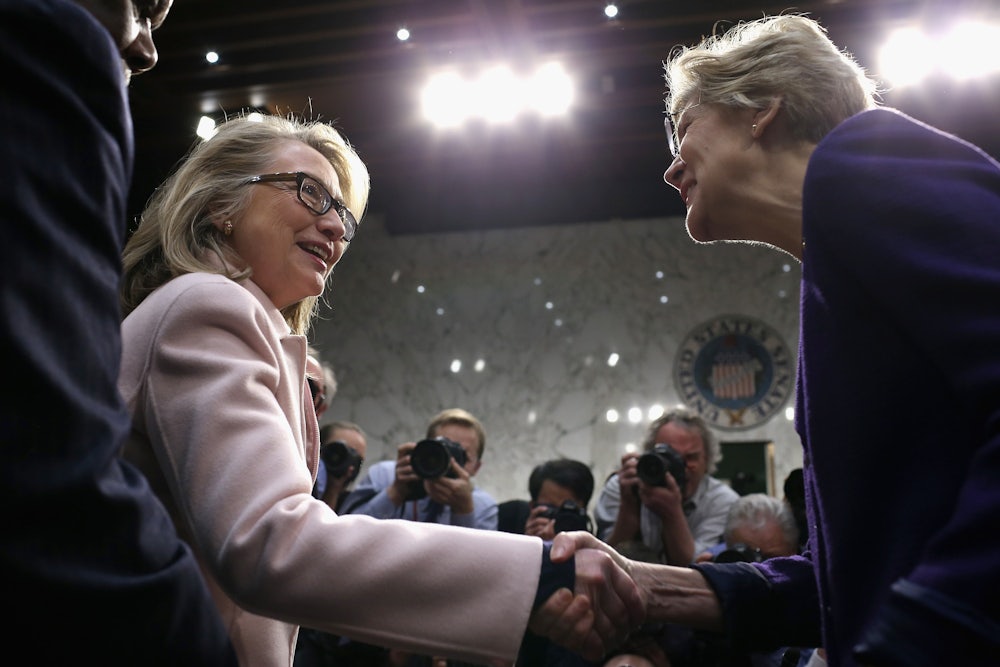Elizabeth Warren’s emergence as Hillary Clinton’s most effective surrogate has apparently unnerved Democratic donors on Wall Street, who are threatening to withhold campaign cash if Clinton selects Warren as her running mate. “If Clinton picked the Massachusetts senator, her whole base on Wall Street would leave her,” one top Democratic donor told Politico. “They would literally just say, ‘We have no qualms with you moving left, we understand all the things you’ve had to do because of Bernie Sanders, but if you are going there with Warren, we just can’t trust you, you’ve killed it.’”
Clinton will either select a Wall Street-friendly running mate or she won’t, but these donors are acting as if she’s running for her old Senate seat from New York rather than the presidency. If the fact that the Clinton campaign is coasting with about $40 million cash on hand—while her opponent, Donald Trump, struggles to stay afloat with less than $2 million—doesn’t take the teeth out of this threat, then the fact that the alternative to a Clinton-Warren ticket would be President Donald Trump certainly should.
Clinton wouldn’t be taking too much for granted by ignoring Wall Street’s panicky, thin-skinned, anti-Warren offensive. But the relative strength of her own campaign—her field operation, her lead in the polls, her fundraising apparatus—will put Clinton’s vice presidential choice in klieg lights for different reasons.
Trump’s weaknesses as a candidate have liberated Clinton from the need to pick a running mate for familiar, defensive reasons. There’s no compelling electoral logic for picking a running mate who helps her seize control of the center, but, by the same token, there’s no countervailing logic for selecting someone who shores up her left flank. Her healthy lead in every recent poll largely neutralizes these concerns. Clinton is in the privileged position of being able to add pretty much whomever she wants to the ticket. And that means her decision will tell the public more than usual about her governing vision.
Presidential candidates frequently treat the obligation to select a running mate as an opportunity to address short-term political problems. The vice presidential nominee is supposed to help with perceived weakness in particular swing states, or even with shorter-term political problems, like a run of bad news cycles. Trump, following this pattern, has said he’ll pick somebody with the legislative experience he lacks.
In 2008, John McCain famously plucked Sarah Palin from obscurity and turned her into a national laughingstock in an attempt to upend the hardening impression that his campaign was hapless and headed for failure. When he was still plotting to secure the GOP nomination this summer at a contested convention, Ted Cruz promised he’d make Carly Fiorina his running mate—a move that was widely interpreted as a stunt to snag media share from Donald Trump. Likewise, running with Lloyd Bentsen didn’t help Michael Dukakis win Texas in 1988, let alone defeat George H.W. Bush, and running with Holy Joe Lieberman didn’t save Al Gore from the phantom stigma of Bill Clinton’s administration in 2000.
This thinking is generally a symptom, rather than a cause, of a candidate’s weakness, and since weak candidates tend to lose, there’s little evidence that selecting a running mate to bolster a campaign does much good—and more to suggest it’s a risky and reckless idea.
Even if Clinton’s fortunes didn’t look so good, in other words, choosing a running mate to cancel out her own weakness wouldn’t make much sense. In the environment we actually inhabit, though, it makes no sense at all. But that means the running mate she eventually does select will rightly be seen as an extension of her own ideology and her views about governing as president.
If Clinton does select Warren, or another progressive, like Ohio Senator Sherrod Brown, political junkies will undoubtedly interpret it as a strategic decision to keep movement progressives in the Democratic fold—or, in Brown’s case, to tighten the Democratic Party’s hold on a crucial swing state. But it would actually be an indication that Clinton approves of the party’s ideological drift since the end of her husband’s presidency, and wants her presidency to boost its momentum in that direction.
But the same logic will make progressive criticism stickier if she decides to elevate an establishment Democrat or a Clinton loyalist or someone else of whom, say, Wall Street would approve. (Virginia Senator Tim Kaine has been floated in this role.)
As she considers her options, Clinton is uniquely insulated from external pressure. Wall Street and other progressive bêtes noire have less leverage than they’re accustomed to having, which may explain why they’re trying to sway her now in public venues. But if she follows suit, it will be because she didn’t need convincing in the first place.
